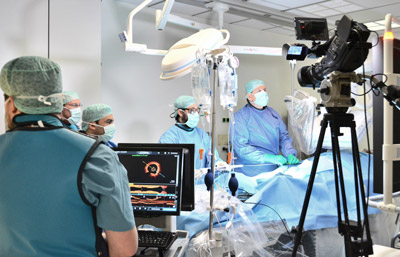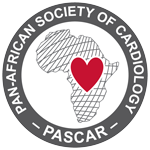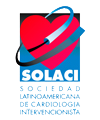Teaming-up to address reperfusion challenges in Africa
“If you want to go fast, go alone. If you want to go far, go together.” Stent-Save a Life! and some renowned African scientific societies recently echoed this African proverb by uniting their efforts to hold collaborative sessions with the objective to tackle the problem of regional challenges of reperfusion.
During a dinner organised by STEMI South Africa after the opening session of the biggest cardiology meeting organised by SA Heart, AfricaPCR and PASCAR in November, representatives of a few African SSL member countries had the opportunity to gather and discuss the challenges of how to improve the systems of care for STEMI management.
The following month, the Sudan Heart Society invited Stent-Save a Life! and PASCAR to join forces during a 3-day interactive conference aiming at advancing cardiac healthcare systems and interventional approach in Sudan and its neighbouring countries.
Stent-Save a Life! & STEMI SA (AfricaPCR/PASCAR/SA Heart 2019)
This year, SA Heart, AfricaPCR and PASCAR jointly hosted Africa’s biggest cardiology meeting in Johannesburg (South Africa) from October 31st to November 3rd.
Gathering medical experts from the continent and beyond the borders, the event offered a unique opportunity for the representatives of a few Stent-Save a Life! member countries to discuss the challenges of how to improve the systems of care for STEMI management during a dinner organised by STEMI South Africa following the opening session.
Sponsored by Biotronik – primary supporter of STEMI SA in 2019 – and honoured by the presence of William Wijns, Jean Fadajet, Marie-Claude Morice and Dave Kettles, SSL Project Manager Rhena Delport kicked-off the evening with the presentation of the preliminary data collected in South Africa identifying the numerous deficiencies of the system. Of striking importance is the fact that the average age of a STEMI patient in South Africa, and probably in the rest of the continent, is 10 years younger than in Europe. Her conclusion highlighted that a remarkable change is evident with regards to adherence to international guidelines on STEMI management in the private sector across regions in South Africa compared with the findings of the STEMI SA pilot study. Of specific note is the observation that reperfusion was achieved within 12 hours of symptom onset in 87% of DA cases and 71% of IFT cases. The high number of patients who did not receive reperfusion therapy is of concern but may be explained by other factors such as the presence of severe co-morbidities or life-threatening complications. The full article is being finalised.
Dr Adriaan Snyders then spoke about Country leadership to establish improved systems of care for STEMI-ACS management. This topic led him to share 10 important lessons he learnt over 7 years of attempts to improve systems of care in South Africa, mainly that the project definitely requires the support of the national cardiac society and the active participation of its members, that any data collection should be kept as simple as possible to ensure a successful participation of the members and, finally, that the First Medical Contact is of primary importance – and so is the communication at this level – since this is where patient management goes right or wrong. Dr Snyders and the audience were re-assured to hear from the international guests that they similarly faced these problems when the STEMI programme was instituted in their respective countries 15 years ago.
The event allowed participants to ascertain that the same primary challenges to improve STEMI care systems are definitely faced in each member country: lots of discussions and meetings are taking place but little implementation – or even none – participation or contribution are to be noted. “Countries know what to do; however, the implementation is THE challenge.”, summarised Adriaan Snyders.
Stent-Save a Life!, PASCAR & Sudan Heart Society (SHS 8th Conference)
Sudan Heart Society (SHS), in partnership with Stent- Save a Life! (SSL) and PASCAR, held its 8th scientific conference on 15-17th December 2019 in Khartoum, Sudan.
400 delegates attended the event that also comprised two specific meetings, the 1st edition of the PIC (PASCAR Intervention Course) and the Africa Stent-Save a Life! workshop.
 Twelve fellows currently in training in Africa and ten practicing cardiologists from across the continent – Ethiopia, Kenya, Uganda, Angola and Tanzania – participated in the full 4 days of scientific activities involving didactic talks in interventional cardiology and a few live case transmissions showing a LMS bifurcation performed by Stent-Save a Life! Chairman Christoph Naber (Wilhelmshaven, Germany), a TAVI by Thierry Lefèvre and Bernard Chevalier (Massy-Paris, France), a CTO and LM stenting by Khalid Altammam (Jeddah, KSA), interventional procedures by conference organiser Awad Mohamed from the cathlab of Shaab Teaching Hospital in Khartoum as well as a live lecture delivered by John McMurray from Glasgow (UK) and by Azeem Latib from New York (USA). It was a feast of unprecedented magnitude in sub-Saharan Africa.
Twelve fellows currently in training in Africa and ten practicing cardiologists from across the continent – Ethiopia, Kenya, Uganda, Angola and Tanzania – participated in the full 4 days of scientific activities involving didactic talks in interventional cardiology and a few live case transmissions showing a LMS bifurcation performed by Stent-Save a Life! Chairman Christoph Naber (Wilhelmshaven, Germany), a TAVI by Thierry Lefèvre and Bernard Chevalier (Massy-Paris, France), a CTO and LM stenting by Khalid Altammam (Jeddah, KSA), interventional procedures by conference organiser Awad Mohamed from the cathlab of Shaab Teaching Hospital in Khartoum as well as a live lecture delivered by John McMurray from Glasgow (UK) and by Azeem Latib from New York (USA). It was a feast of unprecedented magnitude in sub-Saharan Africa.
The highlight of the conference was the Africa SSL workshop with a strong representation of the global initiative as Christoph Naber, Thomas Alexander (Chair of SSL Project Implementation Committee and founder of STEMI India), Jorge Mayol (SSL Regional Champion for Latin America) and Awad Mohamed (SSL Country Champion for Sudan and Regional Champion for Africa) dissected the Stent-Save a Life! success story through the journey covered by the initiative so far.
Such an intervention was enthusiastically welcomed by the African cardiologists, judging by the intense discussions generated by the India and Latin America experiences, and culminated in the audience’s unanimous agreement that the adoption of the Stent-Save a Life! approach for the management of STEMI patients in Africa must be considered.






